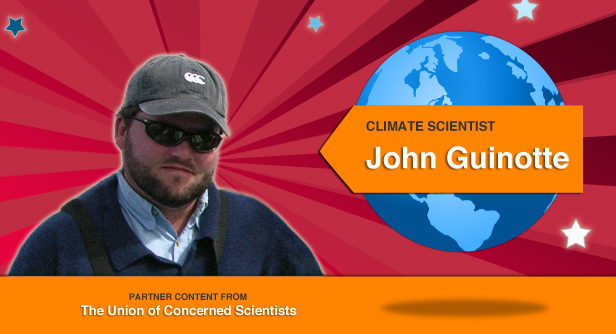The ocean has been our savior.
Besides generating about two thirds of the oxygen we breathe, oceangoing phytoplankton — those floating microscopic plants that form the base of the aquatic food chain — absorb about a third of all the carbon dioxide we pump into the atmosphere. In this way, the oceans have managed to slow the buildup of heat-trapping greenhouse gases and stave off even more dramatic warming of the planet.
But John Guinotte and colleagues are discovering that the critical role of “carbon sink” comes at a potentially devastating cost for the world’s oceans: acidification.
Guinotte is a coral specialist at the Marine Conservation Biology Institute in Bellevue, Wash. The changes he sees in ocean chemistry spell trouble for the coral that he studies closely. If the acidification process continues on its current trajectory, it poses a dire threat to the whole marine ecosystem.

“What I’m really concerned about with ocean acidification is that we are facing the prospect of a crash in marine food webs.” says Guinotte. “There is no question that many of my colleagues in marine science are scared about what is happening. We know we need a more precise understanding of the changes and biological responses now under way — and we need it as quickly as possible, before it is too late to turn things around.”
Guinotte has dedicated his life to the study of coral, especially the less well understood deep-sea varieties. Growing up in rural Kansas, his only exposure to corals was through the pages of National Geographic. But that changed when he learned to scuba dive at his grandfather’s winter home in the Florida Keys. The experience, plus his interest in biology and geography, led him to Australia, where he earned his Ph.D.
Guinotte still remembers the thrill of exploring Australia’s Great Barrier Reef for the first time. “I was absolutely blown away by the abundance and diversity of coral,” he recalls. At that time, back in the late-1990s, scientists were increasingly concerned about coral bleaching caused by environmental stresses such as warming ocean temperatures. Those threats remain, Guinotte says, but ocean acidification may be an even more serious and intractable problem.
On the macro scale, Guinotte explains, the chemistry of ocean acidification is relatively clear. Based on some 25 years’ worth of measurements scientists know that oceans absorb about 22 million tons of carbon dioxide every day. The oceans are vast. But even so, the absorption of CO2 is now occurring at such an unprecedented rate that ocean chemistry is approaching a state not seen in many millions of years. Guinotte fears that many marine species might be unable to adapt quickly enough to survive these dramatic changes.
As carbon dioxide is absorbed by seawater, hydrogen ions are released. This lower the pH, making the water more acidic. Measurements indicate that Earth’s oceans are already about 30 percent more acidic than they were before the industrial revolution. As the number of hydrogen ions has risen, the number of carbonate ions available in seawater has gone down. This carbonate deficit makes life more difficult for the “marine calcifiers,” species such as coral and shellfish that use carbonate to build their skeletons and protective shells.
“Ocean water becomes increasingly corrosive to calcium carbonate,” says Guinotte. “A reduction in carbonate ions not only impedes corals’ ability to build their skeletons, but once the calcium carbonate drops below critical levels, the ocean erodes the framework they have built up previously — the reefs upon which corals live.” Even if select coral species can survive ocean acidification, Guinotte says, when the coral reefs begin to dissolve, the effects on the entire marine ecosystem are likely to be devastating.
Scientists know from the fossil record that reefs which sustained damage from high atmospheric concentrations of CO2 in the geologic past took millions of years to recover. “Given that we need to think in human time scales, it means we’re playing for keeps here,” says Guinotte. “To me, it sometimes seems like a school bus full of children heading for a cliff. Somehow we have to slow it down enough to find some real solutions.”
Because of the very clear potential for ocean acidification to effect everything from the tiniest oxygen-providing phytoplankton to the larger fish that feed in the coral reefs — or, as Guinotte has written, “from the shallowest waters to the darkest depths of the deep sea” — the threat to humankind is immense.
To figure out precisely how much acidification many varieties of coral can tolerate, and what we can do to preserve the health of the marine ecosystem, Guinotte argues for a coordinated research effort that tackles every aspect of the problem. That includes better monitoring of ocean carbon; closer tracking of calcifying organisms and more laboratory and field studies of their physiological responses to increasingly acidicity; and more detailed studies that model the threat to the marine ecosystem as a whole. Some of this work is under way, but too much of it has been conducted in piecemeal fashion. Only a more intensive, coordinated effort, says Guinotte, can provide the detail necessary for policymakers to develop strategies that protect critical species, habitats, and ecosystems.
“From the standpoint of the oceans,” Guinotte says, “there is no escaping the fact that we are going to need major reductions in our CO2 emissions — something like 80 to 90 percent. When we see governments arguing about reductions of 10 to 15 percent, I think all of us in the marine science community need to say that CO2 reductions of this scale are simply not going to be sufficient. We have to get off fossil fuels.”
The fossil record shows that high CO2 concentrations have likely played a big role in mass extinctions of marine life in the past. “If marine systems start to crash, it may well be too late to stop the train,” says Guinotte. “Governments are likely to panic and make irrational decisions; international tensions could certainly heat up. These are the kinds of things that keep me awake at night. I continue to hope we can get it turned around. But it will take political will, and so far, that has been in short supply.”
This is the 12th installment of America’s Climate Scientists: A series from the Union of Concerned Scientists. Click here to read all the climate scientist profiles.
The Union of Concerned Scientists is currently leading a campaign to elevate the voices of climate scientists and educate the public about the overwhelming scientific evidence for human-caused global warming. Learn how you can get involved at www.ucsusa.org/evidence.



